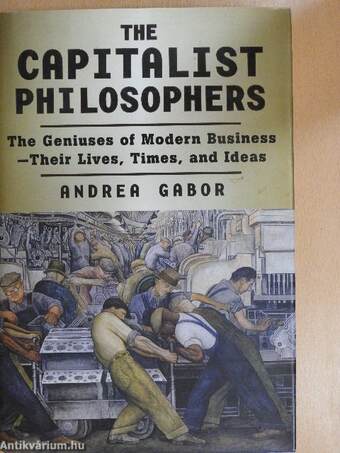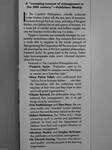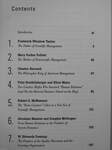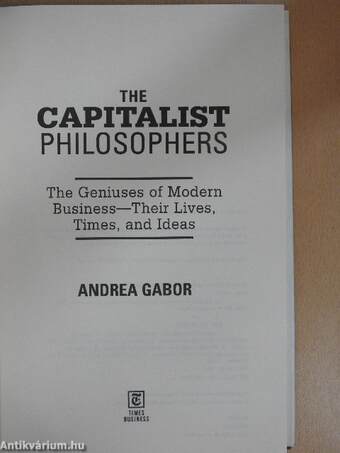1.067.309
kiadvánnyal nyújtjuk Magyarország legnagyobb antikvár könyv-kínálatát

VISSZA
A TETEJÉRE
JAVASLATOKÉszre-
vételek
The Capitalist Philosophers
The Geniuses of Modern Business - Their Lives, Times, and Ideas
| Kiadó: | Times Books |
|---|---|
| Kiadás helye: | New York |
| Kiadás éve: | |
| Kötés típusa: | Fűzött kemény papírkötés |
| Oldalszám: | 384 oldal |
| Sorozatcím: | Times Business |
| Kötetszám: | |
| Nyelv: | Angol |
| Méret: | 24 cm x 17 cm |
| ISBN: | 0-8129-2820-2 |
| Megjegyzés: | További kapcsolódó személyek a könyvben. |
naponta értesítjük a beérkező friss
kiadványokról
naponta értesítjük a beérkező friss
kiadványokról
Fülszöveg
A "sweeping account of management in the 20th century."—Publishers Weekly
In The Capitolisi Philosophers, critically acclaimed writer Andrea Gabor tells the epic story of American business through the lives, times, and ideas of the great thinkers who defined the art and science of business. It is a book full of colorivi stories and brilliant insights into why the business world is the way it is today.
People in business are constontly besieged by sup-posedly revolutionary ideas. Any company that went on a crash diet in response to the trendy precepts of Reengineering the Corporation felt the enormous impact stili exercised by one of the first capitolisi philosophers, Frederick Taylor. By going back to the source, Gabor helps businesspeople make smart, informed décisions about the future.
Featured in The Capitolisi Philosophers are:
•Frederick Taylor: "Production went to his head and filled his sleepless nerves like liquor or women on a Saturday night."
•Mary Parker Follelt,... Tovább
Fülszöveg
A "sweeping account of management in the 20th century."—Publishers Weekly
In The Capitolisi Philosophers, critically acclaimed writer Andrea Gabor tells the epic story of American business through the lives, times, and ideas of the great thinkers who defined the art and science of business. It is a book full of colorivi stories and brilliant insights into why the business world is the way it is today.
People in business are constontly besieged by sup-posedly revolutionary ideas. Any company that went on a crash diet in response to the trendy precepts of Reengineering the Corporation felt the enormous impact stili exercised by one of the first capitolisi philosophers, Frederick Taylor. By going back to the source, Gabor helps businesspeople make smart, informed décisions about the future.
Featured in The Capitolisi Philosophers are:
•Frederick Taylor: "Production went to his head and filled his sleepless nerves like liquor or women on a Saturday night."
•Mary Parker Follelt, who understood that "only so far as business leaders can iden-tify themselves with the underlying social impulses of their time can they hope to pian and build great organizations."
•Chester Barnard, the philosopher king, who believed that managemenfs job is to get things done by persuasion.
•Fritz Roethlisberger and Ellon Mayo, the creative misfits who "invented" human relations and put Harvard Business School on the map.
•Robert McNamara, the "Whiz Kid," whose pioneering work in control and quantitative methods at Ford and the Department of Defense have had such a great influence on American management.
•Abraham Maslow and Douglas McGregor, the pathfinders of humanistic management.
•W. Edwards Deining, "the man who discov-ered quality" and the prophet of the learning organization. Vissza
Témakörök
- Közgazdaságtan > Menedzserképzés, marketing
- Filozófia > Témaköre szerint > Életrajz
- Életrajz > Filozófusok
- Életrajz > Gyűjtemények
- Közgazdaságtan > Közgazdasági elméletek > Egyéb
- Közgazdaságtan > Gazdaságtörténet > Tanulmányok
- Idegennyelv > Idegennyelvű könyvek > Angol > Közgazdaságtan > Menedzserképzés, marketing
- Idegennyelv > Idegennyelvű könyvek > Angol > Filozófia > Témaköre szerint > Életrajz
- Idegennyelv > Idegennyelvű könyvek > Angol > Életrajz > Filozófusok
- Idegennyelv > Idegennyelvű könyvek > Angol > Életrajz > Gyűjtemények
- Idegennyelv > Idegennyelvű könyvek > Angol > Közgazdaságtan > Gazdaságtörténet > Tanulmányok
- Filozófia > Témaköre szerint > Szakfilozófiák
- Közgazdaságtan > Közgazdászok, tudósok
- Filozófia > Témaköre szerint > Filozófiatörténet > Irányzatok
- Idegennyelv > Idegennyelvű könyvek > Angol > Közgazdaságtan > Közgazdászok, tudósok
- Idegennyelv > Idegennyelvű könyvek > Angol > Közgazdaságtan > Közgazdasági elméletek > Egyéb
- Idegennyelv > Idegennyelvű könyvek > Angol > Filozófia > Témaköre szerint > Szakfilozófiák
- Idegennyelv > Idegennyelvű könyvek > Angol > Filozófia > Témaköre szerint > Filozófiatörténet > Irányzatok










